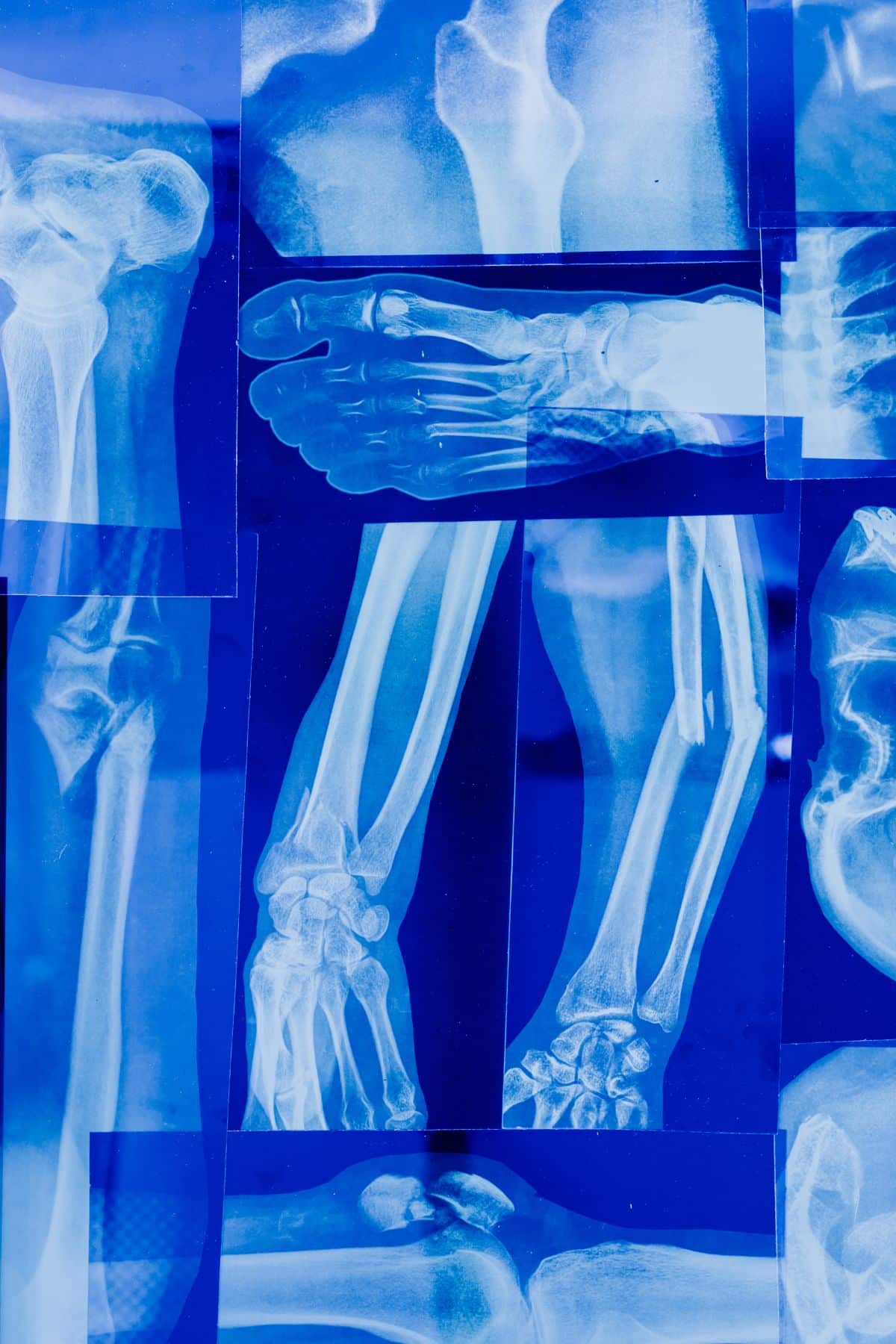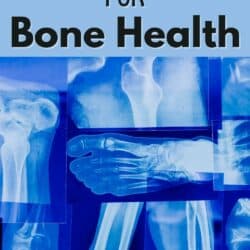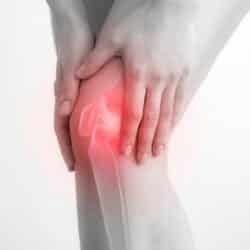13+ Nutrients, Supplements, & Herbs for Bone Health
No matter your gender or age, it’s always a good time to think about optimizing your bone health. In this post, I’ll share 13 nutrients, supplements, and herbs that you can consider for bone health.

Supplements for Bone Health
Here are some of the dietary supplements to consider for strong bones and to reduce the risk of osteoporosis.
It’s important to review your risk factors and determine which nutrients you may be missing from your diet.
1. Calcium

Calcium has many roles in the body, connected to a range of functions from blood clotting to heart rhythm regulation. But it is best known for its association with healthy bones and teeth. In fact, your skeleton stores 99% of the total amount of calcium in your body!
It is generally recommended that adults consume between 1,000 mg and 1,200 mg of calcium daily. Although this can come from either foods or supplements, the average diet tends to provide less calcium than our bodies need.
Sometimes this is because we don’t eat enough calcium-rich foods. But another problem is that calcium is not easily broken down in the gut and is therefore hard for our bodies to absorb.
For that reason, calcium supplements are often recommended to support bone health.
Good food sources of calcium include:
- Milk (including calcium-fortified plant milk)
- Yogurt
- Cheese
- Canned fish like sardines and mackerel (particularly with bones)
- Green leafy vegetables like broccoli, cabbage, and kale
- Tofu
- Soy beans
- Nuts (particularly almonds)
- Calcium-fortified orange juice
- Bread and other baked goods made with calcium-fortified flour
- Dried fruit (especially figs)
The amount of calcium that we can absorb and use from these foods – the bioavailability – varies. Dairy products contain lots of calcium but have a relatively low bioavailability. Plant foods generally contain less calcium but their bioavailability is higher.
If your healthcare provider recommends taking a calcium supplement, then there are two main types to choose from – calcium carbonate and calcium citrate.
Always talk to your doctor before starting calcium supplements as there are drawbacks to taking too much calcium.
You’ll also likely need to pair your calcium supplements with other supplements including adequate vitamin D and vitamin K2.
2. Vitamin D
There are two main ways in which vitamin D supports healthy bones.
Firstly, it plays an essential role in bone resorption, part of a continuous process of bone remodeling that helps maintain a stable bone mass.
It also helps direct calcium to your bones. Its function in this respect is critical – even if you eat lots of calcium-rich foods, your bones won’t benefit from that calcium without the help of vitamin D.
Unfortunately, it is hard to get enough vitamin D from your diet.
The few foods that contain vitamin D are:
- Fatty fish
- Egg yolks
- Fortified cereal
- Fortified milk (including plant milk) and orange juice
- Beef liver
The main way to obtain vitamin D besides food is from sunlight. Some people call vitamin D the “sunshine vitamin” because it is created in our skin following exposure to UVB rays from the sun.
Despite this, around 50% of the world’s population suffers from vitamin D deficiency. That’s because there are various factors that affect just how much vitamin D our bodies can produce.
Spending a lot of time indoors – or living far north or south of the equator – can mean that you are not exposed to the sun frequently enough. Similarly, those that wear clothing covering most of their skin, or people with dark skin, may not be able to make enough vitamin D.
For those reasons, vitamin D supplements are often recommended.
Vitamin D is also on my list of the best remedies for increasing estrogen.
3. Vitamin K
Just like vitamin D, vitamin K helps you absorb calcium from the foods you eat. It helps keep your bones strong, preventing low bone density and fractures.
There are two main kinds of vitamin K – K1 and K2. Although K2 may offer more protection to the bones than K1, both have protective effects and should be included in your diet.
Good sources of vitamin K1 are vegetable oils and green vegetables. These include spinach, kale, mustard greens, Swiss chard, broccoli, Brussels sprouts, and lettuce.
Good sources of vitamin K2 include:
- Poultry
- Pork
- Eggs
- Hard cheeses
- Blue cheese
- Natto (a Japanese dish made from fermented soybeans and one of the best sources available)
But, it can be difficult to get enough vitamin K2 from the diet. Taking additional K2 from a supplements is likely recommended, but ask your doctor first.
4. Magnesium
Magnesium is involved in hundreds of reactions in your body and is very important for the health of your bones. In fact, 60% of the total magnesium in your body is stored in your skeleton.
Studies have shown that being low in magnesium is strongly linked to the development of osteoporosis. Separate research showed that 40% of a group of postmenopausal women with osteoporosis or low bone density were deficient in magnesium.
If your healthcare provider has recommended a magnesium supplement, they will likely have discussed with you the form you need to meet your health requirements. Generally, magnesium in the forms of citrate, carbonate, or oxide has been found to be the most useful for bone health.
For most people, however, the best source of magnesium is the diet. And fortunately, there is a wide variety of foods to choose from in order to meet your needs.
Foods rich in magnesium include:
- Green leafy vegetables
- Nuts
- Seeds
- Legumes
- Whole grains
- Salmon, mackerel, and halibut
- Milk and natural yogurt
- Fortified breakfast cereals
- Bananas
- Avocadoes
- Raisins
- Dark chocolate
5. Boron
Boron is a trace mineral, which means it is an essential nutrient for your health but you only need it in small amounts.
It is important for your bone health because it helps you absorb calcium and magnesium more effectively. It also helps you use vitamin D efficiently.
Researchers have found it to be helpful in maintaining bone and joint health, while studies on animals have found that a deficiency in boron can lead to decreased bone strength.
There is no recommendation as to how much boron you need to consume and the levels of boron in your body are not routinely measured by healthcare professionals.
You should speak to your healthcare adviser before taking boron supplements, as they are seldom necessary. Instead, it’s a good idea to make sure your diet includes the foods that contain it.
Some good food sources of boron are:
- Legumes
- Tubers (like potatoes and yams)
- Fruits and some fruit juices (particularly prune juice)
- Avocado
- Broccoli
- Coffee
6. Strontium
Strontium is another trace mineral, and almost all of the strontium in the human body is found in the bones and teeth.
It works in a similar way to calcium, helping build new bone while slowing the process that breaks down old bone.
Strontium is usually sold as a supplement in the form of strontium citrate. However, you should speak to your healthcare provider before taking strontium supplements as there is very little scientific research into their efficacy.
You can also get strontium in small amounts from foods, and this is the option recommended for most people.
Foods containing strontium include:
- Seafood
- Whole grains
- Beans
- Poultry
- Root vegetables
7. Collagen
Collagen is a protein produced by the body. It helps support the function and structure of cartilage, connective tissue, skin, and bones.
Research has demonstrated that collagen supplementation can help prevent bone breakdown that often results in osteoporosis.
You can obtain collagen from several food sources. Bone broth – which contains a processed form of collagen called gelatin – is one of the best.
However, there is little research to support the idea that you can increase your collagen levels through food. For that reason, many people opt to take a collagen supplement instead.
These are believed to be better absorbed by the body and spplementation with collagen peptides has been shown to be helpful in increasing bone mineral density in postmenopausal women.
Collagen supplements usually come from animal or marine sources. Experts have found marine sources to be preferable, because they are easier to absorb, less likely to cause inflammation, and contain fewer toxins.
You may come across synthetic collagen supplements, too. These are made from insect, mammalian, yeast, and plant cell structures and are used to reduce the risk of allergic reactions.
8. Silica
Silica is a mixture of silicon and oxygen, sometimes known as silicon dioxide.
There is no recommended dietary allowance (RDA) for it and still much research to be done into its benefits. Yet there is some evidence that it is good for our bones!
One study found that silica supports the synthesis of collagen in our bodies and also encourages bone growth. Another study revealed that silica can help prevent bone loss and reduce the risk of fractures.
Silica is an abundant mineral, found in plants, drinking water, and animal sources.
Consuming a diet rich in green leafy vegetables, whole grains, and cereal can help boost your silica levels. You can even treat yourself to a beer, as the barley and hops it contains are great sources too.
Alternatively, you can take silica in supplement form, which is often made with an extract from the horsetail herb. You may also find it an extra ingredient in collagen supplements.
9. Omega-3 fatty acids
Omega-3 fatty acids provide all sorts of health benefits, so it’s good to know that they can support your bones, too!
There are two main ways in which they are helpful.
First, they help improve your calcium absorption, subsequently improving your bone strength and enhancing the synthesis of bone collagen. Secondly, they are very helpful in reducing inflammation.
There are several foods that are high in omega-3 fatty acids including:
- Oily fish like mackerel
- salmon
- sardines
- anchovies
- herrings
You can also take omega-3 fatty acids in supplementary form. Supplements can be helpful if you struggle to eat enough fatty fish on a regular basis.
You have several options and can find supplements available as natural fish oil (the closest thing to real fish) or purified/concentrated fish oil (which usually comes in capsules).
10. Calcium-rich herbs
Did you know that there are several herbs that are rich sources of calcium and ideal for supporting bone health?
Many can be bought in supplementary form or consumed as part of a healthy diet.
Here are some calcium-rich herbs to enjoy:
- Basil (dried or fresh) – add to tomato sauces or use in soups, rice, or pasta dishes
- Ground savory – use in meat rubs, add to stuffing, or use to season bean dishes
- Dried marjoram – add to soups and stews or sprinkle over vegetable side dishes
- Dried dill weed – perfect for fish and egg dishes
- Dried thyme – use in soups, pasta, meat dishes, pizza, and sauces
- Dried chervil – add to seafood or eggs at the end of the cooking time
- Dried parsley – delicious in broths, stews, and soups
- Dried sage – add to pasta sauces, use in stuffing, or fry briefly in butter and use as a garnish for pumpkin dishes
11. Herbs and spices with anti-inflammatory properties
Reducing or preventing inflammation is key to supporting bone health.
Here are some of the best herbs and spices to help fight inflammation, which you can enjoy with meals or consume as a supplement.
- Garlic – add fresh garlic to your bread, soups, sauces, rice dishes, and more
- Ginger – use either the fresh, dried, or ground versions and add to sweet or savory dishes
- Turmeric – this is best taken as a supplement, ideally, one containing black pepper or piperine to enhance absorption
- Rosemary – cook this delicious polyphenol-rich herb with meats. The dried, fresh, or ground versions are all beneficial
- Black pepper – grind over any meal or sprinkle on strawberries to intensify their flavor
- Cardamom – used in stews and curries, or taken in supplementary form
12. Herbs with bone-supporting nutrients
The following herbs contain other nutrients that can help maintain bone health:
- Horsetail – this contains silica and comes in tinctures and capsules. You can also use the dried herb to create a tea
- Red clover – part of the legume family, it may improve bone density. Take it as capsules or use the dried herb to make tea
- Red sage – rich in vitamin K, this can be used to make tea or taken in capsule form
- Dandelion – this is packed with calcium and silicon. The leaves can be cooked or eaten raw while the root can be dried, ground, and used for tea. Capsules and tinctures are also available
- Chamomile – shown to help prevent bone loss, chamomile is best consumed as a herbal tea or taken in capsule form
13. Adaptogenic herbs
Adaptogenic herbs are those that help limit the effects that stress has on the body. They can fight inflammation and may also lead to an increase in calcium levels.
The most common and well-researched adaptogenic herbs are:
- Rhodiola – this is a root that grows in mountainous regions of Asia and Europe. It is best taken as a supplement
- Ashwagandha – powder or extracts are taken from the plant’s roots or leaves and used as supplements
- Ginseng – well known for its ability to fight inflammation, ginseng can be taken in capsule form, or as a powder or liquid
- Licorice – with anti-inflammatory properties, licorice can be consumed as a tea, or in capsules or tinctures. The root itself is also available, either sold dried or fresh
Bone Health Supplement FAQs
Not everyone will need to take supplements in order to support their bone health. A varied diet rich in whole, clean ingredients will often provide all the nutrients required. If you can’t consume certain types of food, are on a special diet, or are in a high-risk group that requires extra nutrients, supplements can bridge the gap and ensure you’re getting everything you need.
It is always best to speak to your healthcare provider before taking any supplement. He or she will help you determine the best supplement for your needs and advise on dosage. This is important, as taking too much of a certain nutrient can sometimes be as dangerous as taking too little.
More Supplement Articles You Might Like
Conclusions
Your bones have many roles in your body, from providing structure to protecting your organs. Consuming the right levels of the nutrients outlined in this guide is the best way to support your bone health, both now and in the future. For optimal bone health, supplements may be necessary in addition to getting a variety of nutrients from foods.
Don’t forget to join my newsletter list to get exclusive clean eating recipes and tips. The newsletter is 100% free with no spam; unsubscribe anytime.
About the Author: Carrie Forrest has a master’s degree in public health with a specialty in nutrition and is a certified holistic nutritionist. She is a top wellness and food blogger with over 5 million annual visitors to her site. Carrie has an incredible story of recovery from chronic illness and is passionate about helping other women transform their health. Send her a message through her contact form.
Note: this post is for informational purposes only and is not intended as medical advice. Please consult your healthcare provider for recommendations related to your individual situation.




















